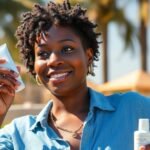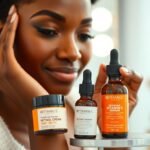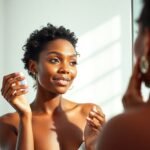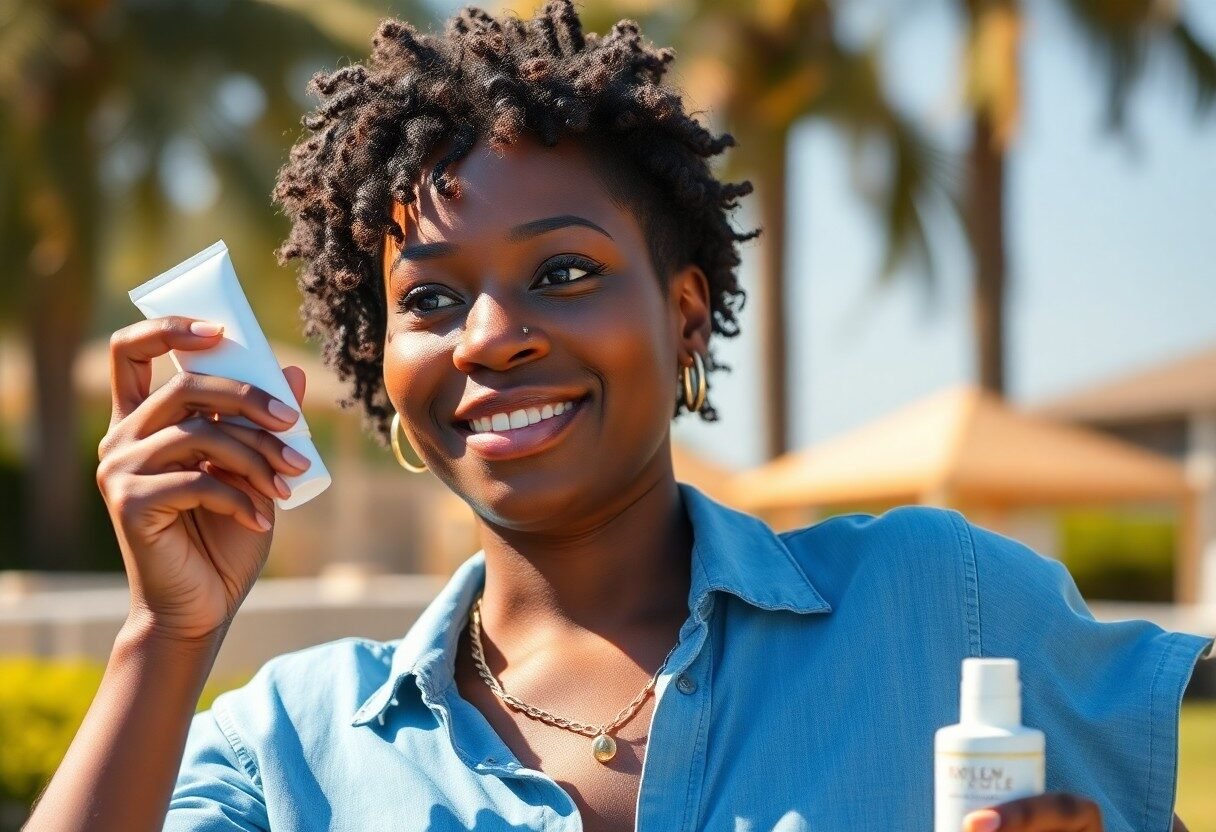
Many of us believe that darker skin tones are naturally protected from the sun’s harmful rays, but this is a misconception that can have serious consequences. I want to help you understand that even if your skin appears less affected by sun exposure, the risk of hyperpigmentation, premature aging, and even skin cancer still exists. By incorporating effective sun protection into your daily skincare routine, you can enhance your skin’s health and maintain its natural beauty. Let’s explore how to safeguard your skin while embracing your stunning complexion.
Key Takeaways:
- Sun protection is vital for all skin types, including African American skin, which is often misunderstood to be less susceptible to sun damage.
- Melanin provides some natural protection from UV rays, but it does not offer complete defense against conditions such as hyperpigmentation and skin cancer.
- Broad-spectrum sunscreen with an SPF of at least 30 is recommended for daily use, even on cloudy days or when indoors, as harmful rays can penetrate windows.
- Incorporating sun protection into skincare routines helps maintain even skin tone and prevent premature aging and other skin issues.
- Physical sunscreens containing ingredients like zinc oxide or titanium dioxide are often well-tolerated and suitable for darker skin tones, leaving minimal white cast.
- Regular application and reapplication of sunscreen, especially during prolonged sun exposure, is key to maximizing protection.
- Educating oneself about skin health and sun safety is empowering and can lead to better skincare practices and overall wellness.
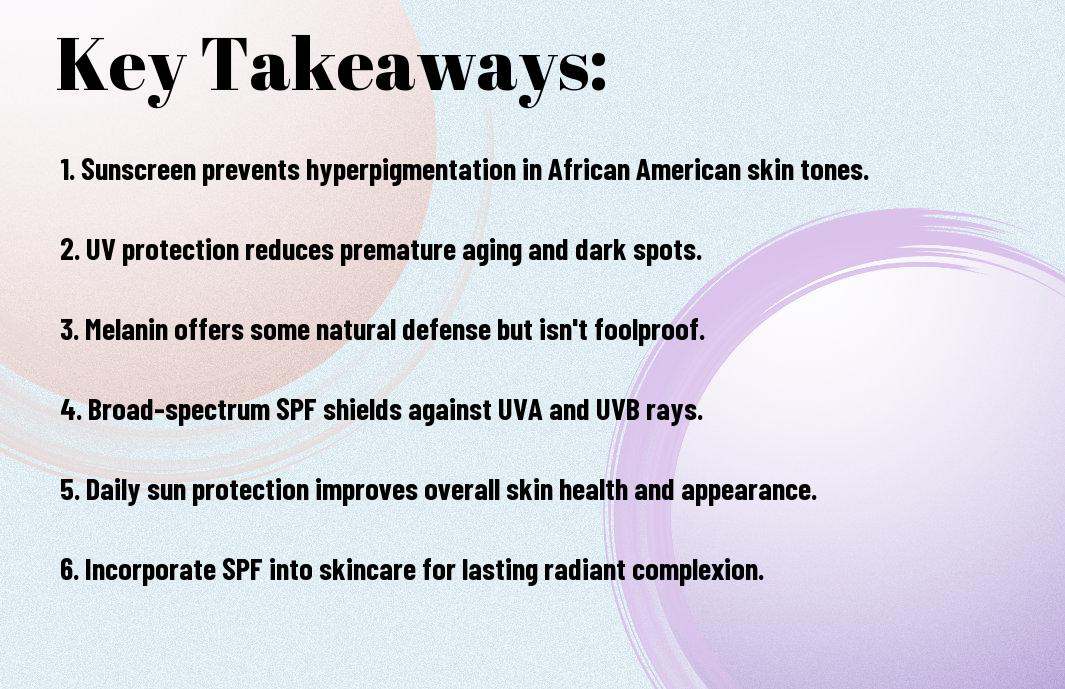
The Myths and Realities of Sun Exposure
Countless misconceptions surround sun exposure and its effects on skin health, especially within the African American community. Contrary to popular belief, darker skin does not offer complete protection from the harmful effects of UV rays. While melanin provides some natural defense against sun damage, this does not mean that individuals with high melanin levels are immune to skin cancer or premature aging. It’s crucial to address these myths to foster a more accurate understanding of skin protection for everyone.
Debunking Common Misconceptions
One of the most pervasive myths is that people with darker skin tones don’t need sunscreen. This misconception stems from the belief that melanin prevents sunburn, leading many to forego necessary sun protection. In reality, while increased melanin does offer some protective benefits against UV radiation, it does not completely shield the skin from damage. In fact, I’ve seen cases where individuals with darker skin develop pigmentation issues and skin cancers due to unprotected sun exposure.
Understanding the Unique Melanin Perspective
Melanin offers a degree of natural protection, but it’s not a blanket solution for all circumstances. This pigment in our skin absorbs UV rays, reducing the risk of immediate sunburn, but it doesn’t render us invincible to other forms of skin damage, like DNA mutations leading to cancer and photoaging. Studies suggest that while African American women may not sunburn as easily, the incidence of certain skin cancers, such as melanoma, can increase dramatically without adequate protection. Being mindful of this unique melanin perspective can significantly transform your skincare routine.
Statistics show that African Americans are diagnosed with melanoma at a lower rate compared to Caucasians, yet the mortality rate is surprisingly high. This disparity highlights the need for awareness and proactive sun protection measures, regardless of skin tone. What many may not realize is that the signs of skin damage can also manifest differently in darker skin, often presenting as subtle changes in pigmentation rather than classic symptoms like redness or peeling. As someone deeply invested in skincare, I advocate for regular use of broad-spectrum SPF and protective clothing to safeguard our skin against both immediate and long-term damage. The absence of sunburn doesn’t negate the potential harm, making sun safety an inclusive priority for everyone.
The Science Behind Sun Damage
Understanding the science behind sun damage provides insight into why sun protection is vital for our skin. UV rays, primarily UVA and UVB, penetrate the skin and cause adverse effects that can lead to premature aging and even skin cancer. UVA rays, which account for about 95% of the UV radiation reaching the Earth’s surface, can penetrate deeper layers of the skin, leading to collagen damage. Meanwhile, UVB rays are primarily responsible for sunburn, directly affecting the skin’s surface. The cumulative effects of exposure can wreak havoc on our skin, regardless of melanin content.
The Impact of UV Rays on Skin Health
UV rays can damage your skin at a cellular level, leading to DNA mutations that increase the risk of skin cancers and accelerate premature aging. Exposure to these rays induces oxidative stress, generating free radicals that destroy healthy skin cells. Studies reveal that even just a few minutes of unprotected sun exposure can have long-term effects. For African American women, who often believe their melanin provides adequate protection, understanding this impact is imperative for maintaining long-term skin health.
How Sun Damage Can Manifest in Darker Skin
While darker skin contains more melanin, which offers some natural UV protection, it is not immune to sun damage. Hyperpigmentation, uneven skin tone, and even skin cancer can still occur. The misconception that darker skin doesn’t need protection can lead to neglect in sun safety practices. When damage does occur, it may not manifest as visibly as on lighter skin, delaying the recognition of the problem until it’s more pronounced and harder to treat.
For example, the effects of sun damage in darker skin can include conditions like post-inflammatory hyperpigmentation—a common occurrence where dark spots develop after the skin experiences trauma. This can happen after sunburn or even after a minor cut. You might not notice sunburn due to deeper skin tones, but the underlying damage is still present and can lead to significant pigmentation issues over time. Investing in proper sun protection is not just about avoiding visible burns; it’s about preserving your skin’s health and appearance for years to come.
Essential Ingredients in Sunscreens
Effective sunscreens contain a range of crucial ingredients that work together to provide optimum protection against harmful UV rays. When choosing a sunscreen, look for formulations that include both physical blockers, like zinc oxide and titanium dioxide, and chemical filters, such as avobenzone and octisalate. These ingredients not only shield your skin from sun damage but also contribute to overall skin health. A good sunscreen should also include moisturizing compounds to keep your skin hydrated and radiant.
Key Components that Cater to African American Skin Types
For African American skin, selecting the right sunscreen means focusing on ingredients that enhance its natural qualities while providing protection.
- Zinc oxide – Offers broad-spectrum coverage without leaving a white cast.
- Titanium dioxide – Gentle and ideal for sensitive skin, preventing irritation.
- Niacinamide – Brightens skin tone and reduces dark spots.
- Shea butter – Adds moisture and soothes dry skin.
- Vitamin E – Protects against free radical damage and promotes healing.
The right combination can vastly improve both protection and skin appearance.
| Ingredient | Benefit |
|---|---|
| Zinc Oxide | Provides effective UV protection |
| Titanium Dioxide | Gentle on sensitive skin |
| Niacinamide | Brightens and reduces dark spots |
| Shea Butter | Moisturizes and soothes skin irritation |
| Vitamin E | Prevents free radical damage |
The Importance of Broad-Spectrum Protection
Broad-spectrum protection is crucial as it guards against both UVA and UVB rays. UVA rays penetrate deep into the skin, leading to premature aging and increasing the risk of skin cancer, while UVB rays are primarily responsible for sunburns. For women with darker skin tones, this dual protection becomes increasingly vital, as we can sometimes underestimate our susceptibility to these rays. Regular use of a broad-spectrum sunscreen minimizes the risk of skin issues and ensures your skin remains healthy.
Many often underestimate how UV rays affect darker skin tones, but the reality is that despite increased melanin offering some level of protection, it is far from a complete shield. Studies have shown that people with darker skin can still experience significant skin damage from UV exposure. Utilizing broad-spectrum sunscreens helps to completely block both types of UV rays, allowing you to confidently protect your skin against sunburn, hyperpigmentation, and early aging signs while engaging in outdoor activities. Sunscreen should be a consistent part of your daily skincare regimen, regardless of the weather or time of year.
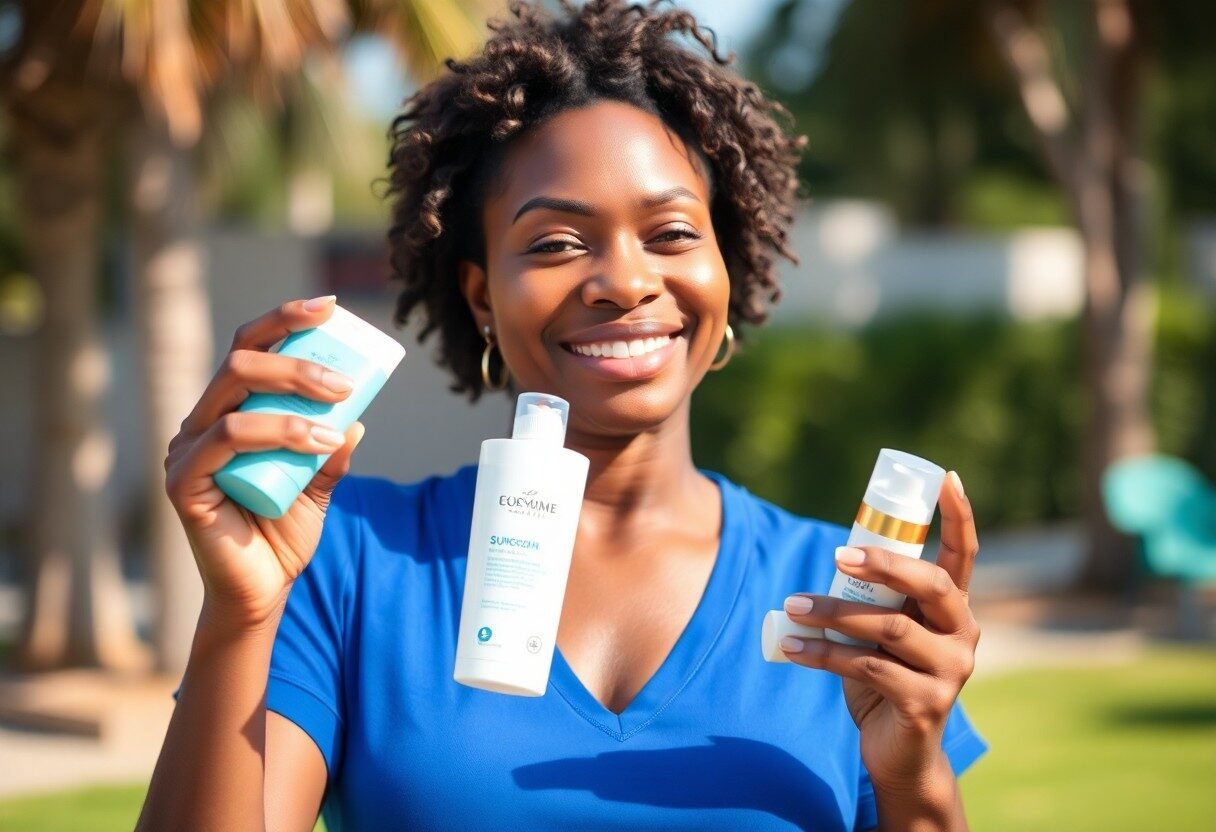
Daily Routine: Integrating Sun Protection
Incorporating sun protection into your daily skincare routine ensures your skin remains healthy and radiant. Start your morning by applying a broad-spectrum sunscreen with an SPF of at least 30 after your moisturizer. Don’t forget to apply it not just to your face, but also to your neck, ears, and any other exposed areas. This routine helps create a barrier against harmful UV rays while allowing you to enjoy the sun confidently.
Practical Tips for Consistent Application
Adopting consistent sun protection is easily achievable with a few practical tips:
- Use a sunscreen that fits seamlessly into your daily skincare regimen.
- Set a reminder to reapply your sunscreen every two hours, especially if you’re outdoors.
- Keep a travel-size sunscreen in your bag for easy access.
- Incorporate protecting skincare products, like moisturizers or makeup that contain sunscreen.
Knowing that short bouts of sun exposure accumulate over time can help you prioritize consistency in your sun protection efforts.
Sunscreen as a Skincare Foundation
Choosing sunscreen as a foundational component of your skincare routine not only protects your skin but also enhances your overall beauty regimen. High-quality sunscreens can serve as both a protective agent and a moisturizer, offering hydration while shielding against UV damage. Some formulations even include antioxidants and vitamins that further nourish the skin. Embracing sunscreen as an imperative layer allows you to ensure your skin stays healthy while also complementing makeup application, making it a versatile addition to your daily skincare imperatives.
Applying sunscreen as a foundational element in your skincare routine provides dual benefits: not only does it protect against sun damage, but it also promotes a more polished, even skin tone. Many modern sunscreens are lightweight and non-greasy, making them ideal bases for makeup, which can amplify your daily look. A tinted sunscreen can even replace your foundation while giving you an instant glow. By treating sunscreen as a skincare staple, I find it smooths and preps my skin, all while ensuring it stays safeguarded from harmful rays. Embrace sunscreen and watch your skin thrive!
The Socio-Cultural Dimensions of Sun Protection
Understanding the socio-cultural dimensions of sun protection provides insight into how we approach skincare within African American communities. Cultural beliefs and historical experiences shape perceptions around beauty, health, and wellness. Many women feel that sun protection is unnecessary due to prevalent myths, which can be rooted in personal experiences and communal narratives. This prevailing mindset underscores the need for targeted education and awareness campaigns that resonate deeply, fostering a collective movement towards embracing effective sun protection practices.
The Historical Context of Skin Protection in African American Communities
Historically, African American communities have valued rich skin tones and often faced societal pressures that impacted their self-image and skin care practices. In the early to mid-20th century, the beauty standards set by mainstream society marginalized dark-skinned individuals, creating a complex relationship with sun exposure. As a result, many women believed that darker skin offered natural protection, leading to a lesser emphasis on sun protection measures that could prevent skin damage and skin cancer.
Addressing Stigma and Awareness Campaigns
Stigmas surrounding sunscreen use and sun protection exist within African American communities, often tied to perceptions of vulnerability and beauty ideals. Awareness campaigns play an imperative role in dispelling myths. Educational outreach has become increasingly effective, emphasizing that sun protection is necessary for everyone, regardless of skin tone. These campaigns can showcase relatable figures and real-life testimonials, empowering women to embrace sun protection as a vital aspect of self-care. Involvement from community leaders and influencers also helps elevate the message, ensuring broader acceptance and understanding.
Community initiatives like local workshops and social media campaigns have begun to shift the narrative around sun protection. Events featuring dermatologists who specialize in melanin-rich skin offer direct insights and practical advice, dismantling myths and providing evidence-based knowledge on the risks of UV exposure. By sharing personal stories and supportive resources, these campaigns lighten the stigma, showing that prioritizing skin health is a form of self-love that transcends beauty standards. Engaging the community through relatable content fosters a proactive attitude towards sun protection, making it an integral part of our collective skincare conversations.
Conclusion
From above, it’s clear that sun protection is an vital aspect of skincare for African American women. I urge you to prioritize incorporating broad-spectrum sunscreen into your daily routine, as it helps prevent hyperpigmentation, premature aging, and skin cancer. Your skin deserves the same level of protection other skin types receive, and using a sunscreen with an appropriate SPF can make a significant difference in maintaining your skin’s health and appearance. Embrace sun protection as a vital part of your beauty regimen for radiant, healthy skin.
FAQ
Q: Why is sun protection important for African American women?
A: Sun protection is vital for everyone, including African American women. While darker skin has more melanin, which offers some natural protection against UV rays, it is not immune to sun damage. Without adequate sun protection, skin can still experience issues like hyperpigmentation, premature aging, and an increased risk of skin cancer. Using sunscreen helps maintain even skin tone and overall skin health.
Q: What SPF level should African American women use?
A: The American Academy of Dermatology recommends using a broad-spectrum sunscreen with an SPF of 30 or higher for all skin types. African American women should choose a product that provides adequate protection against both UVA and UVB rays to help prevent skin damage and maintain a healthy complexion.
Q: Are there specific ingredients to look for in sunscreen for darker skin tones?
A: When selecting sunscreen, African American women should look for formulas that are lightweight and non-greasy to avoid a heavy or sticky feeling on the skin. Ingredients like zinc oxide and titanium dioxide are effective physical blockers, while chemical filters like avobenzone and octisalate also work well. It’s crucial to select a product that does not leave a white cast on the skin.
Q: How often should sunscreen be reapplied?
A: Sunscreen should be reapplied every two hours, or more frequently if swimming or sweating. It is also crucial to apply sunscreen 15 minutes before going outdoors to ensure effective protection. Setting reminders or incorporating sunscreen application into daily routines can help maintain consistent use.
Q: Can makeup products replace sunscreen?
A: While some makeup products contain SPF, they should not substitute a dedicated sunscreen. Most makeup formulations do not provide adequate coverage to ensure effective sun protection. It’s best to apply a broad-spectrum sunscreen as the first layer of your skincare routine and consider makeup with SPF as a supplementary measure.
Q: What are the long-term effects of neglecting sun protection?
A: Neglecting sun protection can lead to various skin issues over time. African American women may experience dark spots, uneven skin tone, and premature wrinkles. Long-term sun exposure without proper protection can also increase the risk of skin cancers, including melanoma. Investing in sun protection is crucial for maintaining youthful, healthy skin and preventing damage.
Q: Is it necessary to wear sunscreen in cloudy weather or indoors?
A: Yes, it is still important to wear sunscreen even on cloudy days or when staying indoors. UV rays can penetrate through clouds, and even indoor lighting can emit UV radiation. To ensure protection against unexpected exposure, incorporating sunscreen into your daily skincare routine is recommended, regardless of the weather or location.
